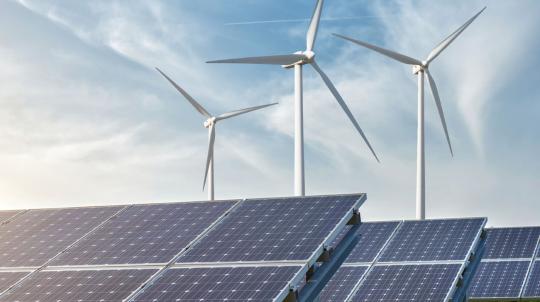
Auctions for Contracts Are Being Introduced to the Draft Amendment of the Renewable Energy Law
An amendment to the Renewable Energy Law has been drafted by the Energy Regulatory Commission of Mongolia and is being planned to be submitted to the Parliament discussions. Please see below a summary of the main changes to the Renewable Energy Law.
Auctions for Contracts
Among the changes to the Renewable Energy Law, the notable one is the introduction of the auction-based approach for renewable energy contracts. The auction scheme will be adopted in addition to the “Feed-in-Tariff”. The government will announce the location and capacity of a specific renewable energy project and will select the contractor based on the lowest bidding price for the electricity to be delivered to the grid.
The authority in charge of adopting the detailed auction rules and organizing the auction will be the Ministry of Energy, according to the draft amendment.
Sale of Electricity to Distribution Networks from User’s Renewable Energy Sources
Another concept introduced in the draft amendment is the ability to sell electricity to the electricity distribution networks by users with a renewable energy source. Such ability will allow the users to install small capacity renewable sources, such as rooftop solar panels, at their premises and sell energy to the nearby users using the distribution network in the area.
The tariff for the electricity sold by the end-user renewable energy generators to the distribution networks will be determined by the Energy Regulatory Commission and to be reviewed on annual basis. Detailed regulations are currently being drafted.
Feed-in-Tariff Changes
Feed-in-Tariffs (“FIT”) of renewable energy sources selling electricity to the grid is being changed under the draft amendment. Please see below respective changes in FIT per kWh.
| Source | Old FIT | New FIT |
| Wind Sources | 8.00 – 9.50 US Cents | Up to 8.00 US Cents |
| Solar Sources | 15.00 – 18.00 US Cents | Up to 12.00 US Cents |
Proposed FITs are approximately 15-30% lower than the current maximum FITs and eliminate the minimum limit of FIT as opposed to the current FIT in the law. The draft amendment currently does not provide whether such changes in the FIT will retroactively apply to current renewables projects with FITs approved by the Energy Regulatory Commission.
Miscellaneous
Another change proposed in the draft amendment law is that the sellers under the Power Purchase Agreements to submit a project implementation guarantee (in the form of a bank guarantee or deposit) for guaranteeing the performance of the seller’s obligations under the Power Purchase Agreement. The amount of the guarantee is currently being proposed by US$ 50.00 per kW.
Read More
Indirect Transfer of Mineral Licenses – Taxable Starting from January 1, 2018
The tax treatment of offshore/onshore indirect transfers i.e. sale of shares of a Mongolian company holding mineral license(s) – has emerged as a significant issue in recent years in Mongolia.
The report prepared by the staff of the International Monetary Fund on “Safeguarding domestic Revenue-A Mongolia DTA[1] Model” from 2012 (“IMF Report”), as part of technical assistance to the Mongolian Government, points to the absence of taxing mechanisms for an “indirect transfer of mineral licenses” under Mongolian laws and notes the following:
- Mongolia is only able to safeguard its taxing rights on an indirect sale of exploration and mining licenses in a limited number of DTAs;
- Mongolia should include a provision in its DTAs that reserves its right to tax capital gains on the sale of shares that derive more than 50 percent of their value from immovable property situated in Mongolia”.
New Regime
With effect commencing from 1 January 2018, an indirect transfer of mineral licenses will be subject to tax pursuant to the amendments to the Minerals Law, Law on Registration Legal Entities and the Business Entity Income Tax Law (“BEITL”) from November 10, 2017 (“Amendments”), which is believed to be a direct outcome of recommendations made to the Mongolian Government by various multinational and aid institutions over the years.
The Amendments provide:
- that the sale of shares of a Mongolian company, holding a mineral license, in whole, or in part, by a “beneficial holder” shall be subject to income tax in Mongolia;
- that any such transfer of mineral license shall be deemed “sale of right” pursuant to Article 17.2.7 of the BEITL, as such, shall be subject to tax at the rate of 30%;
- that any tax evasion, misreporting of income, or failure to provide documents to be used for the valuation (of shares/ and underlining assets i.e. mineral license)) shall serve as the ground for termination of a mineral license.
Transfer-Pricing and Re-assessment of Taxes
Under the current regime, the taxes to be paid in connection with the transfer of mineral licenses are separately reviewed, and if deemed necessary, re-assessed, based on Article 48 of the General Taxation Law and Article 11 of BEITL by the designated department of the General Taxation Office.
Only after the completion of such review, do the tax authorities allow the transfer a mineral license. When conducting its valuation of mineral licenses, the tax authorities take into consideration all investments put into the project, the total amount of license fees paid, and in case of mining licenses, the value of equipment and ancillary facilities to the mine, etc.
We note that there is no detailed methodology for transfer pricing in the Mongolian tax laws which allow for a restatement of income when goods are sold/transferred for a value less than the market price. Although the concept of the market price is somewhat obscure, especially in the case of mineral exploration licenses, the above procedure has been consistently followed by the tax authorities since 2011 and involved considerable discretion on the side of the tax authorities.
The Amendments provide that the detailed methodology for the valuation of shares (along with underlying assets) and assessment of taxes shall be adopted by the Ministry of Finance.
Therefore, it is anticipated that the Ministry of Finance will adopt detailed rules pertaining to the determination of arm’s-length pricing of the shares in question, simultaneously with the Amendments entering into the effect.
Effect of Double Taxation Treaties
Mongolia is a signatory to 25 double taxation treaties. Most tax treaties Mongolia has entered into contain typical UN and OECD model tax convention wording which provides that that with respect to the sale of shares that capital gains tax is to be paid only in the country of residence of the seller, except where the gain is “derived from the alienation of shares deriving more than 50 percent of their value directly or indirectly from immovable property (definition of “immovable property” normally includes “mineral licenses”) situated in the other Contracting State may be taxed in that other State” (i.e. Mongolia). Other treaties omit the “except” entirely, which seems to provide for capital gains to be paid in other treaty party jurisdiction only even in respect of companies where the value is derived from mineral licenses.
Shortcomings and Conclusion
The Amendments do not provide for an exemption for the transfer of shares as part of intragroup restructuring and sale of shares through trading on stock exchanges. These shortcomings will need to be rectified by the Parliament in a timely manner as they may adversely affect the investment image of the country.
Given the above developments, investors should consider obtaining thorough tax advice and conduct double taxation treaty analysis before structuring the corporate holdings of their mining projects in Mongolia.
[1] DTA refers to “Double Taxation Agreement”Read More

New Regulations: Tax on Transfer of Land Possession and Use Rights, Registry of Ultimate Beneficial Owners
On 9 November 2017, the State Great Hural (Parliament) of Mongolia adopted amendments to the General Taxation Law, Corporate Income Tax Law, Personal Income Tax Law, Legal Entity Registration Law, and Land Law.
Tax on Transfer of Land Possession and Use Rights
Until recently, there has been no precedent for imposing taxes on the transfer of land rights and the transfer of shares of companies that hold land rights.
On 9 November 2017, the State Great Hural (Parliament) of Mongolia adopted amendments to the Legal Entity Registration Law, Land Law, Corporate Income Tax Law, and Personal Income Tax Law and legislated for the first time that any direct and indirect transfer of land possession and use rights by individuals and legal entities will be subject to tax. These new regulations will become effective from 1 January 2018.
We summarize the key elements of the new regulations as follows:
- Business entities will be subject to income tax at the rate of 30 percent on taxable income derived from a direct transfer of land possession and use rights whereas individuals will have to pay 10 percent income tax on the same income.
- Any transfer of shares by the Ultimate Owner of a company that holds land possession and use rights will be subject to a 30 percent tax. In such cases, the value of the land right will be proportioned to the number of shares transferred by the Ultimate Owner.
- The Ministry of Finance will approve a detailed methodology for determining taxable income from direct and indirect transfers of land possession and use rights.
- Income derived from transferring land possession and use rights between family members free of charge will be exempt from personal income tax.
- Holders of land possession and use rights must pay the applicable taxes prior to the transfer and must submit a bank receipt evidencing the tax payment along with an application for the transfer of land rights.
- If land right holders fail to declare and pay applicable taxes, the land authority will terminate the land rights and claim for repayment of damages.
- Companies that hold land possession and use rights must withhold or deduct the applicable taxes and pay such to the State budget within 7 business days after the relevant transaction was made.
We expect that the methodology to be approved by the Finance Minister will provide for more detailed rules and clarifications on determining taxable income and withholding taxes.
New Requirement to Register Ultimate Beneficial Owners
Companies that hold land possession and use rights must provide information about their Ultimate Owners with their registered tax offices within 1 June 2018.
The term “Ultimate Owner” includes persons who directly or indirectly owns the largest number of shares or voting rights. Where another legal entity is a shareholder (rather than an individual), disclosure of beneficial ownership further up the chain of legal entities is required until the ultimate owner is identified.
Read More
New Mining Law Draft Incoming
Minister of Mining and Heavy Industry Ts.Dashdorj and Minister of Justice and Internal Affairs S.Byambatsogt have approved a concept for a new Mining Law draft in January 2017. A new working group was established at the Ministry of Mining and Heavy Industry to draft the new Mining Law, which would form the basis of the mining legislation and considered to be one of the most important legal approaches to the geological and mining industry.
The new Mining Law covers the gap that the current legislations that regulating mining where the issues related to the investment, prospecting, mining, processing of minerals, rehabilitation, occupational safety as well as the mine closure are left uncovered. The existing Minerals Law, adopted on 08 July 2006 and amended numerous times, focuses more on regulating licensing and cadastral activities. However, the current Minerals Law will remain effective and will not be replaced by the proposed Mining Law, whereas, current Law on Common Minerals will be completely replaced by the Mining Law.
Scope of the new Mining Law draft
The new Mining Law now being drafted aims to regulate all aspects of the mining lifecycle starting from the establishment to closure of mine including geological survey, exploration, conducting a feasibility study, mining, processing and sale of minerals, protection of the environment, health and safety of the miners themselves. It covers 145 articles.
There is a widely-held hope that the new Mining Law will bring positive changes that clarify the roles and responsibilities of government authorities and license holders and will help to regain the foreign and domestic investment.
Read More

